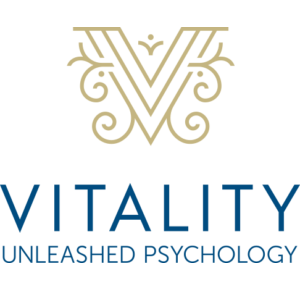PSYCHOMETRIC TESTING
About our Psychometric Testing & Diagnosis Services
At Vitality Unleashed Psychology, we believe in individualised care for each and every client. When requested, your practitioner can provide recommendations for ASD, ADHD, cognitive, intellectual, developmental, personality and functional assessment/s applicable to your circumstances. Psychometric assessments can be completed for both children/teens and adults/older adults. A more comprehensive list of concerns that psychometric testing can be administered for can include:
- Autism Spectrum Disorder (ASD)
- Attention Deficit/Hyperactivity Disorder (ADHD)
- Learning Disorders (eg reading, writing difficulties)
- Intellectual Impairments
- Cognitive difficulties such as memory &/or executive functioning problems
- Concerns regarding adaptive behaviour functioning (e.g., in the context of Parkinson’s disease, ASD or other disabilities)
- Personality testing/personality disorder assessment
Our clinic can also provide an assessment of intellectual functioning (IQ testing).
We provide psychometric testing from the following list of tests below, as deemed applicable:
Adaptive Behavior Assessment System, Third Edition (ABAS-3)
The Adaptive Behaviour Assessment System, Third Edition (ABAS-3) is a comprehensive assessment tool that measures adaptive behaviour in individuals aged 0 to 89 years. It is designed to evaluate an individual’s ability to function in daily life activities and adjust to environmental demands. The ABAS-3 is composed of a series of subtests that assess different adaptive skills, including communication, self-care, functional academics, community use, health and safety, leisure, self-direction, and social skills.
The ABAS-3 is used to identify an individual’s strengths and weaknesses in adaptive behaviour, diagnose developmental disorders or disabilities, and develop appropriate interventions or treatment plans. It can also be used to monitor progress over time and evaluate the effectiveness of interventions or treatments. Its results can be used to inform educational planning, support individualised learning, and identify individuals who may require additional support or accommodations to achieve success in daily life activities.
Autism Diagnostic Interview-Revised (ADI-R)
The Autism Diagnostic Interview-Revised (ADI-R) is a semi-structured diagnostic interview used to assess and diagnose autism spectrum disorder (ASD) in children and adults. The ADI-R test consists of a series of questions that cover various aspects of an individual’s behaviour and development, such as language skills, social interactions, and repetitive behaviours. These questions are designed to gather information from parents or caregivers who know the individual well. The ADI-R test provides scores on several domains, including communication, social interaction, and repetitive behaviours and interests. The scores are used to identify specific patterns of behaviour that may indicate the presence of ASD.
The test gathers information about an individual’s behaviour, communication skills, and social interactions, which are crucial in diagnosing ASD. The ADI-R also provides psychologists with valuable information about an individual’s strengths and weaknesses, which can be used to develop effective treatment plans and interventions.
Autism Diagnostic Observation Scale (ADOS-2)
The ADOS-2 allows you to accurately assess and diagnose autism spectrum disorders (ASDs) across age, developmental level, and language skills. This revision improves an instrument already viewed as the gold standard for the observational assessment of autism spectrum disorders (ASDs). With updated protocols, revised algorithms, a new Comparison Score, and a new Toddler Module, the ADOS-2 provides a highly accurate picture of current symptoms unaffected by language. The ADOS-2 can be used to evaluate almost anyone suspected of having ASD—from 1-year-olds who do not consistently use phrase speech to adults who are verbally fluent.
Like its predecessor, the ADOS-2 is a semi-structured, standardized assessment of communication, social interaction, play, and restricted and repetitive behaviors. By observing and coding these behaviors, clinicians can obtain information that informs diagnosis, intervention, treatment planning, and educational placement.
Adult ADHD Self Report Scale (ASRS)
The ASRS scale is an easy-to-use, norm-referenced assessment designed to identify symptoms, behaviours, and associated features of the full range of Autism Spectrum Disorders. Parents and teachers are asked to evaluate how often they observe specific behaviours in the child or adolescent in areas such as socialisation, communication, unusual behaviours, behavioural rigidity, sensory sensitivity, and self-regulation. The ASRS was designed to effectively identify symptoms, behaviours, and associated features of Autism Spectrum Disorders (ASDs) in children and adolescents aged 2 to 18, and links in with DSM-5.
Behaviour Assessment for Children, 3rd Edition (BASC-3)
The Behaviour Assessment System for Children, Third Edition (BASC-3) is used to evaluate behavioural, emotional and social functioning in children and adolescents. The BASC-3 assesses a wide range of behaviours and emotions including hyperactivity, anxiety, depression, aggression, social skills, and adaptive functioning. The assessment also includes adaptive behaviour scales, which assess the individual’s ability to function independently in daily life tasks, such as communication, socialisation, and self-care. The results provide a comprehensive picture of the individual’s behaviour and emotional functioning.
The results can be used to guide treatment planning, monitor progress, and evaluate the effectiveness of interventions. The adaptive behaviour scales can be used to identify areas of strength and weakness in adaptive functioning and inform intervention planning to improve the individual’s ability to function in daily life.
Childhood Autism Rating Scale, Second Edition (CARS-2)
The Childhood Autism Rating Scale, Second Edition (CARS-2) is a standardised assessment tool used to evaluate the severity of autism spectrum disorder (ASD) symptoms in children. The CARS-2 consists of 15 items that assess behaviours related to social interaction, communication, and repetitive behaviours.
The CARS-2 is used to diagnose ASD and monitor the progress of treatment. It can also be used to identify children who may be at risk for ASD or to screen large groups of children for ASD symptoms. It can help psychologists better understand the symptoms of autism in children and develop appropriate treatment plans to support their development and well-being.
California Verbal Learning Test®- Children’s Version (CVLT-C)
The California Verbal Learning Test for Children (CVLT-C) is a standardised assessment tool used to evaluate the verbal learning and memory abilities of children between the ages of 5 and 16 years. The test measures the child’s ability to recall and recognise a list of words, as well as their ability to learn new information over multiple trials.
The CVLT-C is used to identify specific areas of memory impairment in children, as well as to monitor changes in memory over time. The test can be used to evaluate memory functioning in children with a range of conditions, including ADHD, learning disabilities, and traumatic brain injury. The results of the CVLT-C can also be used to develop targeted interventions and treatment plans to support the child’s cognitive and academic development.
California Verbal Learning Test®- 3rd Edition (CVLT-3)
The California Verbal Learning Test, Third Edition (CVLT-3) Standard evaluates an individual’s verbal learning and memory abilities. It is a widely-used test that assesses a person’s ability to learn and recall verbal information presented to them over multiple trials. The CVLT-3 measures a range of verbal memory abilities, including immediate recall, short-term memory, long-term memory, recognition, and retrieval of information.
The CVLT-3 Standard is used to evaluate individuals with suspected memory impairments, such as those with traumatic brain injury, dementia, or neurological disorders. The test provides information about the person’s memory strengths and weaknesses, which can be useful for developing treatment plans or interventions to support memory function.
Conners Adult ADHD Rating Scales (CAARS)
The Conners Adult ADHD Rating Scales (CAARS) is an assessment tool used to evaluate adults for symptoms of Attention Deficit Hyperactivity Disorder (ADHD). The test evaluates a range of symptoms associated with ADHD, including inattention, hyperactivity, and impulsivity. It also assesses other factors such as anxiety, depression, and oppositional behaviour that may occur concurrently with ADHD.
The CAARS test provides an overall score that can be used to diagnose ADHD and assess the severity of symptoms. It also provides scores for specific sub-scales that allow the psychologist to identify which symptoms are most problematic for the individual being assessed. This test provides important information for diagnosis and treatment planning.
Conners 4th Edition (CONNERS-4)
The Conners-4 (Conner’s-4) is an assessment tool that measures the behavioural and emotional problems and functioning of children and adolescents. The test components assess a range of behaviours, including inattention, hyperactivity, impulsivity, anxiety, depression, and defiance.
It is often used by psychologists, educators, and healthcare professionals to diagnose and monitor conditions such as attention deficit hyperactivity disorder (ADHD), anxiety, depression, and oppositional defiant disorder (ODD). The results can inform the development of treatment plans, as well as tracking progress and monitoring changes in symptoms over time. The results can lead to appropriate interventions to improve the mental wellbeing of children and adolescents.
Delis-Kaplan Executive Function System (D-KEFS)
The Delis-Kaplan Executive Function System (D-KEFS) is a neuropsychological assessment tool designed to measure higher-level cognitive functions. It assesses executive functioning in six areas: verbal fluency, inhibition, cognitive flexibility, problem-solving, planning, and creativity.
The D-KEFS is used to evaluate the effects of various neurological disorders or brain injuries on executive functioning. It can also help identify areas of strength and weakness in executive functioning, which can guide the development of tailored interventions to address specific cognitive deficits.
Delis-Rating of Executive Function System (D-REF)
D-REF lets you quickly and easily administer, score, and report the frequency of observed behaviour’s that identify executive function problems. This flexible, sensitive assessment includes parent, teacher, and self-ratings. Three core indexes and a total composite score are provided via the D-REF online scoring and reporting site that are based on three manifestations of executive control problems.
Diagnostic Interview for ADHD in Adults (DIVA 2.0)
The DIVA is based on the DSM-IV criteria and is the first structured Dutch interview for ADHD in adults. The DIVA has been developed by J.J.S. Kooij and M.H. Francken and is the successor of the earlier Semi-Structured Interview for ADHD in adults2,3. In order to simplify the evaluation of each of the 18 symptom criteria for ADHD, in childhood and adulthood, the interview provides a list of concrete and realistic examples, for both current and retrospective (childhood) behaviour. The examples are based on the common descriptions provided by adult patients in clinical practice. Examples are also provided of the types of impairments that are commonly associated with the symptoms in five areas of everyday life: work and education; relationships and family life; social contacts; free time and hobbies; self-confidence and self-image.
Expressive Vocabulary Test, Third Edition (EVT-3)
The EVT-3, or Expressive Vocabulary Test, Third Edition, is a standardised assessment used to measure expressive vocabulary in children and adults. The test involves showing the participant a series of pictures and asking them to name each one, with the difficulty of the pictures increasing gradually. The EVT-3 is used to identify expressive vocabulary strengths and weaknesses and to track progress over time
This test is used to evaluate language development and language disorders.
Kaufman Test of Educational Achievement, 3rd Edition (KTEA-3)
The Kaufman Test of Educational Achievement, Third Edition (KTEA-3) assesses the academic achievement of students. The test evaluates various areas of academic performance, including reading, writing, math, and oral language skills.
The KTEA-3 can be used to identify learning disabilities, measure academic progress, and help develop educational plans tailored to a student’s individual strengths and weaknesses. It can also be used to evaluate the effectiveness of academic interventions and determine eligibility for special education services.
Monteiro Interview Guidelines for Diagnosing the Autism Spectrum (MIGDAS)
The Monteiro Interview Guidelines for Diagnosing the Autism Spectrum, 2nd Edition (MIGDAS-2) is a sensory-based process for gathering and organising the qualitative information needed to diagnose autism in children, adolescents, and adults.
NEPSY, 2nd Edition (NEPSY-II)
The only customisable measure of neurocognitive processes. With the NEPSY-II, the Psychologist can create a tailored assessment across the following domains: executive functioning, attention, language, memory and learning, sensorimotor functioning, social perception, and visuospatial processing. It also evaluates academic skills, such as reading, writing, and math. The results provide information relating to typical childhood disorders, which can lead to accurate diagnoses and intervention planning for success in school and at home.
The NEPSY-II is often used to diagnose learning disabilities, ADHD, and other neurodevelopmental disorders. It can also help identify strengths and weaknesses in specific cognitive domains, which can guide educational and therapeutic interventions.
Peabody Picture Vocabulary Test, 5th Edition (PPVT-5)
The PPVT-5, or the Peabody Picture Vocabulary Test – Fifth Edition measures receptive vocabulary knowledge. The test assesses an individual’s ability to understand words presented orally and to select a corresponding picture from an array of four pictures. You can directly compare receptive and expressive vocabulary when you also administer the EVT-2.
This test assesses language ability and development and diagnose language disorders.
PROMIS (Patient-Reported Outcomes Measurement Information System) Sleep Scale
The PROMIS (Patient-Reported Outcomes Measurement Information System) Sleep Scale is a standardised measure used to assess various aspects of sleep quality and disturbance. It consists of a set of questions that assess different domains of sleep, including sleep disturbance, sleep-related impairment, and sleep-related quality of life.
The PROMIS Sleep Scale is used to evaluate sleep patterns and disturbances in patients with a variety of health conditions, including chronic pain, cancer, and mental health disorders. The scale can help psychologists to identify sleep problems, monitor changes in sleep quality over time, and evaluate the effectiveness of interventions aimed at improving sleep in patients with various health conditions.
Personality Assessment Inventory (PAI+/PAI-A)
Personality Assessment Inventory (PAI), developed by Leslie Morey (1991, 2007), is a self-report 344-item personality test that assesses a respondent’s personality and psychopathology. Each item is a statement about the respondent that the respondent rates with a 4-point scale (1-“Not true at all, False”, 2-“Slightly true”, 3-“Mainly true”, and 4-“Very true”). It is used in various contexts, including psychotherapy, crisis/evaluation, forensic, personnel selection, pain/medical, and child custody assessment. The test construction strategy for the PAI was primarily deductive and rational. It shows good convergent validity with other personality tests, such as the Minnesota Multiphasic Personality Inventory and the Revised NEO Personality Inventory.
PROMIS (Patient-Reported Outcomes Measurement Information System) Sleep-Related Impairment Scale
The PROMIS (Patient-Reported Outcomes Measurement Information System) Sleep-Related Impairment Scale is a self-report measure used to assess the impact of sleep difficulties on an individual’s daily functioning. It assesses the extent to which sleep difficulties have affected various aspects of an individual’s life, such as their ability to concentrate, their mood, and their ability to carry out their usual activities. The scale includes items related to sleep quality, sleep-related symptoms, and daytime fatigue.
This test can be used to assess the impact of sleep difficulties on an individual’s quality of life and to track changes over time.
Raven's 2
The RAVEN’S 2 Progressive Matrices (RAVEN’S 2) is a nonverbal intelligence test used to measure cognitive ability, particularly fluid intelligence. The test measures the individual’s ability to identify patterns, think abstractly, and solve problems. The RAVEN’S 2 is a culturally fair and unbiased measure of intelligence that does not rely on language or specific knowledge. As such, it is particularly useful for individuals from diverse cultural and linguistic backgrounds or for those who may have difficulty with verbal communication.
The RAVEN’S 2 is commonly used in educational settings to identify students with high intellectual potential or to diagnose learning disabilities. In clinical settings, the test can aid in the diagnosis of cognitive impairments or in the assessment of cognitive functioning in individuals with neurological disorders or brain injuries.
Rey Auditory Verbal Learning Test (RAVLT)
The standard RAVLT format starts with a list of 15 words, which an examiner reads aloud at the rate of one per second. The patient’s task is to repeat all the words they can remember, in any order. This procedure is carried out a total of five times. Then the examiner presents a second list of 15 words, allowing the patient only one attempt at recall. Immediately following this, the patient is asked to remember as many words as possible from the first list. Because the test is brief, straightforward, easy to understand, and appropriate for both children and adults (ages 7 through 89 years), it has gained widespread acceptance
Repeatable Battery for the Assessment of Neuropsychological Status Update (RBANS Update)
The Repeatable Battery for the Assessment of Neuropsychological Status Update (RBANS Update) is a brief cognitive assessment tool that evaluates a person’s cognitive function in several areas, including immediate and delayed memory, attention, language, and visuospatial skills. The RBANS can be repeated with alternate forms.
The RBANS is used to screen for potential cognitive impairment, track cognitive changes over time, and aid in diagnosis and treatment planning for conditions such as dementia, traumatic brain injury, and stroke.
Social Responsiveness Scale (SRS)
The Social Responsiveness Scale (SRS) is a questionnaire used to assess social impairments related to Autism Spectrum Disorder (ASD). The SRS measures a wide range of social behaviours, communication skills, and social interactions that are common among individuals with ASD.
The SRS is used to screen for ASD and to assess the severity of social impairments in individuals with ASD. The SRS is also used to monitor progress in treatment and to evaluate the effectiveness of interventions aimed at improving social skills and reducing social impairments in individuals with ASD.
Trauma Symptom Checklist for Young children (TSCYC)
Trauma Symptom Checklist for Young Children – The TSCYC contains eight Clinical scales: Anxiety, Depression, Anger/Aggression, Post-traumatic Stress-Intrusion, Post-traumatic Stress-Avoidance, Post-traumatic Stress-Arousal, Dissociation and Sexual Concerns, as well as a summary post-traumatic stress scale (Post-traumatic Stress-Total). These scales provide a detailed evaluation of post-traumatic stress, as well as information on other symptoms found in many traumatised children. The PTSD Diagnosis Worksheet incorporates information from the TSCYC to assist the user in evaluating PTSD criteria in younger children, and provides a possible PTSD diagnosis in children ages 5 years or older (sensitivity = .72, specificity = .75). The TSCYC is appropriate for English-speaking caretakers, including those who have a relatively low reading level (Flesch-Kincade score = 6.8).
Test of Non-Verbal Intelligence, Fourth Edition (TONI-4)
The Test of Nonverbal Intelligence, Fourth Edition (TONI-4) is a standardised test designed to assess an individual’s cognitive abilities and intelligence without relying on verbal or language-based skills. The TONI-4 uses abstract shapes and designs to measure a person’s ability to reason logically and solve problems, as well as their spatial and perceptual abilities.
The TONI-4 is used for a variety of purposes, including identifying intellectual strengths and weaknesses, diagnosing learning disabilities, evaluating cognitive functioning in cases of brain injury or neurological conditions, and assessing cognitive abilities in non-English-speaking individuals.
Test of Premorbid Functioning (TOPF)
A revised and updated version of the Wechsler Test of Adult Reading™, the Test of Premorbid Functioning (TOPF) enables clinicians to estimate an individual’s level of cognitive and memory functioning before the onset of injury or illness.
Effective method for predicting intellectual and memory performance. Ideal for clinicians who wish to develop appropriate treatment plans.
Composed of a list of 70 words that have atypical grapheme to phoneme translations.
Can be given in addition to WAIS–IV / WMS–IV assessment to provide an estimate of change in abilities.
Can be used in forensic evaluations to evaluate suspected loss of cognitive functioning.
Vineland Adaptive Behavior Scales, Third Edition (Vineland-3)
The Vineland Adaptive Behaviour Scales, Third Edition (Vineland-3) is a standardised assessment tool used to evaluate an individual’s adaptive behaviour and functional skills. It measures an individual’s ability to perform daily living skills, communicate effectively, and interact with others in their environment. The Vineland-3 is intended to be used with people of all ages, from infancy to adulthood, with or without disabilities. The Vineland-3 consists of several subtests that assess different areas of adaptive behaviour, including communication, daily living skills, socialisation, and motor skills. The results of these subtests are combined to obtain an overall adaptive behaviour composite score.
It’s results can be used to inform educational planning, support individualised learning, and identify individuals who may require additional support or accommodations to succeed in academic and daily life activities.
Wechsler Individual Achievement Test, Third Edition (WIAT-III)
The Wechsler Individual Achievement Test, Third Edition (WIAT-III) is a standardised assessment tool used to measure academic achievement in children and adults. The WIAT-III is composed of a series of subtests that assess different academic skills, which are then combined to derive an overall achievement score.
The WIAT-III is used to evaluate academic strengths and weaknesses, diagnose learning disabilities or developmental disorders, and plan appropriate interventions or educational accommodations. It can also be used to monitor academic progress and evaluate the effectiveness of interventions or educational programs. The results can inform educational planning, support individualised learning, and identify individuals who may require additional support or accommodations to achieve academic success.
Wechsler Adult Intelligence Scale, Fourth Edition (WAIS-IV)
The WAIS-IV (Wechsler Adult Intelligence Scale, Fourth Edition) is an intelligence test designed to measure cognitive abilities and strengths. The test measures an individual’s overall intelligence quotient (IQ) as well as their verbal comprehension, perceptual reasoning, working memory, and processing speed.
The WAIS-IV is used for diagnostic and treatment planning purposes, as well as for evaluating intellectual ability and potential. The WAIS-IV is also used to help guide decisions regarding academic placement and career development.
Wechsler Memory Scale®- 4th Edition (WMS-IV)
The Wechsler Memory Scale – Fourth Edition Adult (WMS-IV – Adult) assesses memory function in Adults up to 65 years of age. The WMS-IV is used to evaluate different aspects of memory, including immediate memory, delayed memory, working memory, and recognition memory. The test consists of various subtests that assess visual and auditory memory, verbal learning, and memory for designs and faces.
The WMS-IV Adult can be used to identify memory problems associated with various conditions such as dementia, brain injury, and psychiatric disorders, and to assist in developing appropriate treatment plans.
The Wechsler Memory Scale – Fourth Edition Older Adult (WMS-IV – Older Adult) is used to evaluate memory abilities in older adults aged 65 years and older. It is used to assess different aspects of memory function, such as immediate and delayed memory, working memory, and learning ability, among others. The test includes various subtests, including auditory and visual memory tasks, word and story recall tasks, and spatial memory tasks, among others.
This test is used to identify memory strengths and weaknesses in older adults, diagnose memory impairments, and develop individualised treatment plans to address memory deficits.
Wechsler Intelligence Scale for Children, Fifth Edition (WISC-V)
The WISC-V (Wechsler Intelligence Scale for Children, Fifth Edition) is used to measure cognitive abilities. The test provides information about a child’s intellectual strengths and weaknesses, including their general intellectual ability (IQ) and specific cognitive abilities such as verbal comprehension, visual-spatial processing, fluid reasoning, working memory, and processing speed.
The WISC-V is used to determine a child’s IQ as well as to inform decisions about placement, intervention, and treatment for children with learning and developmental difficulties. It can also be used to identify gifted children and to assess the effectiveness of interventions designed to improve cognitive functioning.
Wide Range Achievement Test, 5th Edition (WRAT5)
The WRAT5, or the Wechsler Individual Achievement Test, is a standardized test that measures an individual’s basic academic skills. The test assesses an individual’s reading, spelling, and math skills, providing scores for each area.
The WRAT5 is used to evaluate academic achievement and to identify learning disabilities, as well as to track progress in academic interventions.
Fees
Service (Duration) |
Age Range |
Cost – Psychologist |
Cost – Clinical Psychologist |
|---|---|---|---|
|
Initial Consultation (50min) |
3+ years |
$200.00 |
$240.00 |
|
Post-assessment follow-up consultation (50min) |
3+ years |
$200.00 |
$240.00 |
|
Reporting^ (see below for more information) |
|
$264.00/hr pro-rata, inc GST |
$316.80/hr pro-rata, inc GST |
|
Test pricing – variable costs per tests, quoted to each client. |
TBA |
TBA |
Example Quote with a Psychologist for ADHD Testing:
- Initial consultation: $200 (Medicare rebate $92.90 with valid MHCP)
- CAARS Self & Observer test: $80
- ABAS-3 Self & Observer test: $50
- D-REF Self & Observer test: $60
- Scoring/Interpretation/Reporting: $1056 (4 hours, inc gst)
- Follow-up consultation: $200 (Medicare rebate $92.90 with valid MHCP)
Total upfront cost: $1646 (incl. GST)
Total Out Of Pocket Cost: $1460.20 (incl. GST) after Medicare rebate where applicable
Important notes:
*The information provided in this document is offered as a guide only. A detailed quotation will be offered to you by the clinic. All pricing is subject to change at any time.
^Scoring, interpretation and final report writing for each assessment by the examining practitioner, is in addition to the assessment costs and is determined by the number of assessments each client chooses to utilise and the time taken to complete. Each situation is unique and as such, reporting is calculated on a pro-rata hourly rate.
~Some assessments may consist of multiple units or require more than one to be administered IE: one questionnaire for the parent and one for the teacher to complete. This requires multiple units being used therefore the cost is per unit.
by vitalityunleashed | Jun 2, 2023 | Uncategorized | 0 Comments
Concussions have become a growing topic of concern in the world of sports, medicine, and everyday life. These traumatic brain injuries (TBI) can occur in various...
by vitalityunleashed | Jun 2, 2023 | Uncategorized | 0 Comments
Obsessive-Compulsive Disorder (OCD) is a serious disorder and chronic condition that affects around 1 in 40 adults and 1 in 100 children in the United States. And...
by vitalityunleashed | Jun 2, 2023 | Uncategorized | 0 Comments
Autism Spectrum Disorder (ASD) is a complex neurodevelopmental condition that affects individuals' social, communication, and behavioural abilities. ASD is...
by vitalityunleashed | May 12, 2023 | Uncategorized | 0 Comments
Autism Spectrum Disorder (ASD) is a complex neurodevelopmental condition that affects how an individual processes information, interacts with others, and experiences...
by vitalityunleashed | May 12, 2023 | Uncategorized | 0 Comments
How Neurotransmitters Influence Your Behaviour and Emotions As psychologists and Clincial psychologists, we’re always fascinated by how the human brain works. One of...
by vitalityunleashed | May 11, 2023 | Uncategorized | 0 Comments
As Psychologists, we are able to have a good understanding of someone who has been diagnosed with Borderline Personality Disorder (BPD), and the challenges that come...
by vitalityunleashed | Apr 21, 2023 | Uncategorized | 0 Comments
by vitalityunleashed | Apr 21, 2023 | Uncategorized | 0 Comments
by vitalityunleashed | Apr 21, 2023 | Uncategorized | 0 Comments
We will respond to your enquiry during our reception hours Monday to Friday (Closed Public Holidays & Weekends).
FOLLOW
Become A Member
[contact-form-7 id=”2212″ title=”become a member”]
Copyright 2023 | All rights reserved











